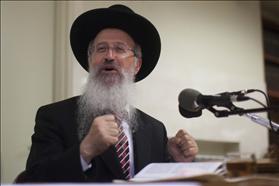Corruption breeds corruption
Israeli religious establishment is internationally highlighted for its excessive corruption
The Global Corruption Barometer found that 73% of Israelis perceive the religious establishment to be either corrupt or extremely corrupt. In the rest of the world, religious institutions are the least corrupt. What does this say about religion in Israel?
05/08/2013 14:02
Tags: Chief Rabbinate · Israeli Judaism · religious establishment · corruption barometer · freedom of religion

The Sephardic Rabbi Avraham Yosef at his father, Rabbi Ovadia Yosef's class in Jerusalem. Photo: Yonatan Sindel/Flash90
In July, Transparency International published the Global Corruption Barometer, which provides a global perspective on corruption in government agencies in 107 countries. Israel, like many other countries, was perceived by Israelis to have several institutions that are perceived to be corrupt in the public sector. Israel, however, blatantly stands out from the rest of the countries when it comes to religious institutions.
While the majority of the countries surveyed thought that religious institutions were the least corrupt, 73% of the Israeli public perceived Israel's religious institution to be extremely corrupt. Israelis think that the religious establishment is one of the most corrupt institutions in the country (second only to political parties). This ranked Israel third in terms of the public's perception of corruption in religious institutions. The first two countries in this category were Sudan and Japan.
Given the Chief Rabbinate's ultra-Orthodox monopoly on religious life and many other critical areas of influence in Israel, the public's dissatisfaction and disdain towards the religious establishment is logical, but not acceptable.
The gaping contrast between Israelis' perspective on the religious establishment and the rest of the world's attitude clearly demonstrates the damaging effect that the unholy alliance of religion and politics has had on the Jewish and Democratic State of Israel.
The gaping contrast between Israelis' perspective on the religious establishment and the rest of the world's attitude clearly demonstrates the damaging effect that the unholy alliance of religion and politics has had on the Jewish and Democratic State of Israel.The coercive practices in marriage, divorce, conversions, and the denial of recognizing and funding non-Orthodox Jewish denominations all play a critical role in distancing Israelis from religion.
Additional polling demonstrates a similar sentiment. While the majority of Israelis support freedom of religion and equality, they also believe the religious establishment distances Jews from Judaism. Similarly, 67% of Israelis oppose the Chief Rabbinate in its current form. Cititzens should be able to expect the religious establishment to stand for justice and righteousness and fight corruption, but in Israel, the institution is plagued by it.
Until the Chief Rabbinate ceases to enjoy coercive power and control over Israeli citizens and Judaism, the public's disapproval of the religious establishment will only weaken the relevance of religion in Israel.